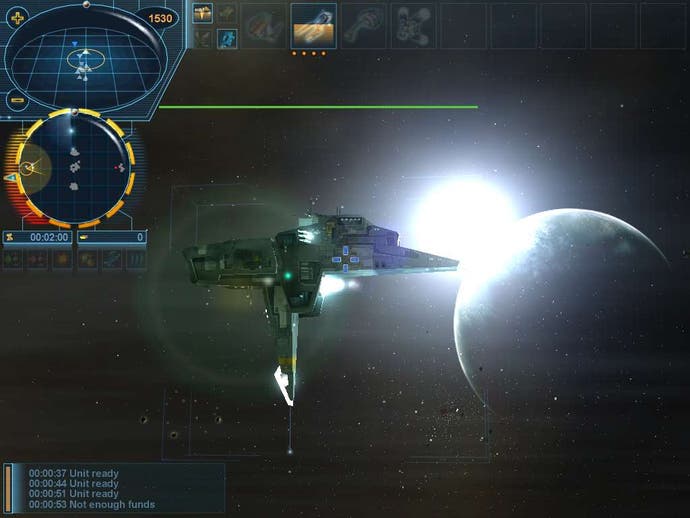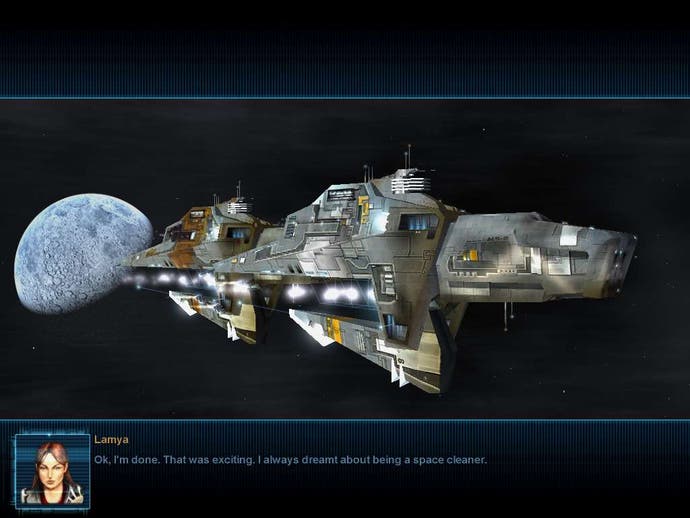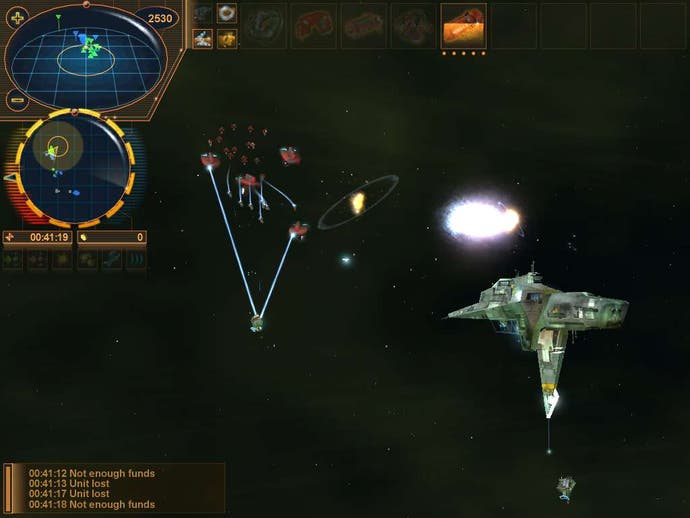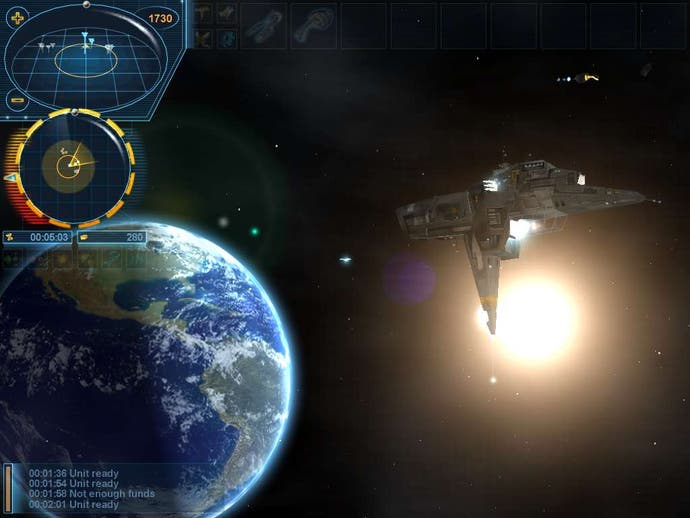Project Earth
Review - Lemon's space strategy game faces Starmageddon at the hands of Gestalt

Through The Light Projected
It's almost three years now since Homeworld took the real-time strategy genre to another dimension, doing away with old fashioned ideas like terrain and controlling the high ground and setting the whole thing in deep space instead. Since then a few developers have attempted to mirror its success, but most have fallen short. Have Lemon Interactive done any better with the-game-formerly-known-as-Starmageddon, or have they merely lived up to their rather unfortunate name?
Project Earth makes a fairly good first impression, mostly thanks to its eye-catching graphics. Space is colourful without being garish, and the ships within it are nicely detailed, leave pretty trails behind them as they fly around and produce spectacular explosions when they're destroyed. It's hardly a leap forwards from Homeworld, but it is pretty enough. The camera controls you use to navigate this space would be more at home in a first person shooter, but by the time you've completed the (admittedly rather dull) tutorial most of it should be second nature. The mouse rotates your view of the universe, the arrow keys move you left and right, backwards and forwards, and page up and page down handle vertical movement, while clicking the middle mouse button zooms you quickly to whatever spot in space the cursor is currently hovering over. If you need to select multiple units or click on one of the interface buttons ringing the screen, simply hold down the control key and your view locks into place, leaving the cursor free to move around the screen in a more traditional manner.
Unfortunately it's all downhill from here. The plot is a cliché-ridden mishmash of ideas pinched from other games and movies, starting with a mysterious race of aliens hitching a lift behind a comet which appears out of thin air headed straight towards Earth. Now where have I heard that one before? Dialogue and voice acting are unremarkable, and the alien voices are garbled by some hilariously poor processing which makes them sound like juvenile Daleks. Sound effects are repetitive and uninspiring, and quickly become annoying in the midst of big battles as the same four or five laser noises are triggered over and over again, booming out across half the map. The one redeeming factor on the audio side is the spacey electronic soundtrack, which is actually quite good.

She's Gonna Make You Cry
Project Earth doesn't fare any better on the gameplay front either. The human campaign, for example, starts with a tedious mission forcing you to mine or destroy every asteroid in the map, but as you can't carry any ships, technology or resources from one mission to the next this is a monumental waste of time and effort that doesn't teach you anything that you haven't learnt already in the tutorial.
Mission descriptions are vague and often unhelpful, and the game gives you almost no help once you've started. In some levels you're expected to control more than one mothership at a time, in completely seperate maps representing different sectors of space, leaving you to flick between them using the function keys with no clue as to what's going on elsewhere. If any of these motherships are destroyed, the game ends abruptly with absolutely no explanation, which may leave you wondering what the heck just happened.
Thankfully the European version of the game does at least include the ability to pause and save the game mid-mission, something woefully lacking in the US release, but the lengthy load times can still prove painful. You wouldn't think that it would take over half a minute to paint a pretty backdrop and plonk a few lumps of rock into a big empty space. And if you're finding the going too tough (or too easy) you're out of luck - difficulty settings are only available in the game's skirmish mode.

Slowly Slipping Under
What really sinks Project Earth though is the AI, which is pitiful even by the low standards of the real-time strategy genre. Ships show little or no initiative most of the time, and will quite happily sit staring into space as your base ship is picked apart with laser beams a few pixels away.
The enemy AI is just as poor, showing no understanding of attack and defence and instead simply launching units at you in a piecemeal fashion and then watching as they get blown to smithereens. If you can withstand the initial onslaught you'll be hard pressed to lose in a fair fight, as all you need to do is occupy the area with the most asteroids and pick off enemy mining units as they come to collect resources. The AI will continue building miners and sending them straight into your fighters time and again without so much as varying the route they take, so if you just sit back and wait the computer will eventually run out of resources and you can take apart its base ships at your leisure.
Project Earth also lacks most of the niceties of modern strategy games, such as waypoints, patrol routes and guard orders. All you can do is tell a ship to be aggressive (in which case it moves to chase any enemy that passes right under its nose, even if that leads it into the heart of the enemy base) or defensive (it stands rooted to the spot whatever happens and just fires back at anything shooting it). Oh, and there's a self-destruct button, which is handily placed right next to the aggression controls and doesn't bother to ask you whether you really meant to press it before blowing up every unit you currently have selected. Nice one. When it comes to manhandling your ships, they can be told to attack a single unit (by clicking on the target - almost impossible for small fast moving fighters) or a group of enemies (by holding down the alt button and dragging the mouse over the ships you want to attack). You'll need to do this a lot though, as units have a tendency to stop fighting in the middle of a battle and just sit around waiting for something to shoot at them, even when they're supposedly set to aggressive. This almost total lack of automation combined with dumb AI leaves you to micro-manage practically everything.

Holding On To Nothing
The game is also deeply unhelpful and user unfriendly at times, not bothering to tell you little things like what a given unit actually does when you start building it. Given that ships are all named after ancient Greek monsters and the like, working out what they are can be a case of trial and error.
Luckily there are only a handful of combat units on each side for you to learn, although Lemon seem to have managed to make even these unbalanced. The biggest, most expensive units are completely overpowering, virtually invulnerable, and have beam weapons that can reduce your mothership to dust faster than you can reload the level. It doesn't help that your mothership is fairly weak and completely defenceless without an escort. Meanwhile the game's tech tree is more of a stunted lawn, with everything available to research from the outset, although you do at least have to choose your priorities as most technological advances are a case of "either, or". For example, do you want fighters to cause more damage to stationary or moving enemies, and would you prefer your miners to move faster or have bigger cargo bays?
Continuing the trail of despair is the multiplayer support, which is essentially a waste of space. There's no in-game server browser or matchmaking facility, and Project Earth doesn't even support third party browsers like GameSpy, surely the lowest common denominator for multiplayer gaming on the PC these days? Your only option is to find someone else who wants to play online and type in their IP address by hand, which is so 1995. If you actually do find an opponent, or enough mugs willing to play the game at a LAN party, you have a choice of about half a dozen uninspiring and often poorly designed maps with room for between two and eight players. You can play against the computer in skirmish mode, but given the shortcomings of the AI this isn't a particularly entertaining alternative.
Conclusion
Project Earth is without doubt the worst Homeworld clone I have ever had the misfortune to play, falling far short of its potential thanks to some fairly elementary design flaws. There's little tactical depth, unit behaviour controls are almost non-existent, the campaign is tedious and unforgiving, the AI lousy and the multiplayer bodged. Do yourself a favour, if you must have a space strategy game, pick up a budget copy of Homeworld and leave this lemon on the shelf.

